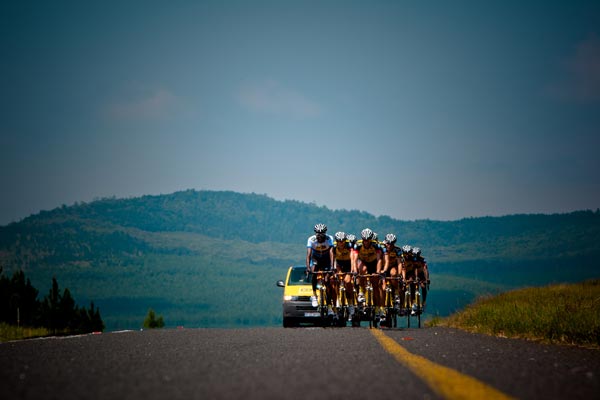UCI grants second division licence to African team


The latest race content, interviews, features, reviews and expert buying guides, direct to your inbox!
You are now subscribed
Your newsletter sign-up was successful
The Union Cycliste Internationale (UCI) granted its first second division licence to an African team yesterday. MTN-Qhubeka, based in South Africa, received the OK along with Colombia-Coldeportes and USA's Team Type 1.
"We are an African-registered, African-sponsored team with 70 per cent of our riders from the African continent making it the aspirational African team in world cycling," team principal, Doug Ryder told Cycling Weekly.
"Event organisers have not seen a team like ours before in world cycling and we showed this year that our team can be competitive at the highest levels of the sport."
The team will base itself in Lucca, Italy, and said it already has invitations to ASO's Tour of Qatar and Oman. Besides a handful of European riders, it boasts riders from Eritrea to Algeria.
The UCI also said that it would announce its 18 first division teams (ProTeams) and remaining second division teams (Professional Continental) on December 10.
Related link
MTN Qhubeka team aims for Grand Tours
The latest race content, interviews, features, reviews and expert buying guides, direct to your inbox!
San Remo and Lombardy switch days
The Milan-San Remo and Tour of Lombardy one-day classics, after yesterday's UCI approval, will both run on Sunday next year.
The races, both one of cycling's five Monuments, originally ran Saturday. It's not the first change, San Remo traditionally ran on March 19 to celebrate Saint Joseph's day.
Related link
UCI WorldTour calendar 2013
Giro brings back time bonuses
The Giro d'Italia organiser announced on November 20 that it will bring back time bonuses for next year's race. All stages expect time trials will feature bonus seconds - 20, 12 and 8 - for the top three finishers.
In addition, the organiser will add a second intermediate sprint, both carrying bonuses of 5, 3 and 2 seconds. It said the change will make every stage "exciting and hard fought."
The rule is a shift from this year, when not only the time trials, but also the five key mountain stages were based on pure time. It varies from the Tour de France, where in recent years bonuses have not been on offer.
Fabian Cancellara and Bradley Wiggins were the only two in the yellow jersey throughout the Tour. Had bonuses been on offer, sprinters or other fast finishers, like Peter Sagan, may have had their chance to wear the famed leader's jersey.
It is a hotly-debated topic. Bonuses shaped the overall outcome of the Vuelta a España last year. Juan José Cobo won the race by 13 seconds on Chris Froome. Had he not picked up 32 seconds in bonuses, Froome may have won the race by 19 seconds.
Liquigas general manager and Sagan's boss told Cycling Weekly earlier this year he would rather not have them, but said that it is better to have an all or nothing approach. He said, "For the final GC, it's better not to have them. To do it halfway - some stages no, some stages yes - isn't good. You either have them or you don't."
Related link
Stage time bonuses return to Giro
Legeay's MPCC movement gains members
The Movement for a Credible Cycling (MPCC), with its stricter anti-doping codes, is gathering pace ahead of the new season. In the last two weeks, five teams and the European Cycling Union (UEC) signed on.
Former Crédit Agricole general manager, Roger Legeay started the movement in the wake of the Operación Puerto doping scandal. He has received renewed support following the US Postal Service Conspiracy investigation that saw Lance Armstrong stripped of seven Tour de France wins.
The movement's members approved the applications of second division team Bardiani-CSF (Ita) and third division teams La Pomme Marseille (Fra), Auber 93 (Fra), Optum (USA) and Plussbank - BMC (Nor). It brings the total member count to 16, with four first division teams: AG2R La Mondiale, FDJ, Garmin-Sharp and Lotto-Belisol.
Others are waiting to join: Jelly Belly Cycling (USA), Colombia-Coldeportes (Col), Accent Jobs (Bel), OCBC Singapore (Sin) and Roubaix Lille Metropole (Fra).
Member teams agree to follow the MPCC's standards of conduct:
- Prohibit a rider from racing after the positive result of the first analysis or A sample.
- Don't sign a rider who has had a ban of more than six months during the two years following his ban. An exception is given to whereabouts cases.
- If a rider needs corticosteroids (used for saddle sores and swelling) then pull him from competition for eight days.
- An internal control following a positive test within the team.
- If a team has more than one positive case from the past 12 months, withdraw it and assess the situation.
The MPCC asked the Association of Race Organisers (AIOCC) only to invite teams, MPCC members or not, that adhere to its standards. The Belgian federation and the European Cycling Union (UEC) have lent their support.
The UEC on November 19 said it would ban riders who served suspensions for more than six months from participating in the national teams for two years. It also will require eight days of rest if a rider needs a corticosteroid injection.
Related link
Change Cycling Now group to pressure UCI
Gregor Brown is an experienced cycling journalist, based in Florence, Italy. He has covered races all over the world for over a decade - following the Giro, Tour de France, and every major race since 2006. His love of cycling began with freestyle and BMX, before the 1998 Tour de France led him to a deep appreciation of the road racing season.
